Dua For Visiting The Grave In English, Transliteration, And Arabic
In Islam, it is important for us to visit our relatives, sick as well as the graves. While visiting the graveyard, it is sunnah to read dua for visiting the grave.
Advertisements
Visiting the Grave means going to burial ground in accordance to the command of the Messenger of Allah SAW.
Dua For Visiting The Grave In Meaning English
The meaning of dua for visiting graves in English is peace be upon you O people of the dwellings, believers and Muslims, In sha Allah we will join you, I ask Allah to keep us and you safe and sound
Dua For Visiting Grave in Arabic
The dua for visiting the grave in Arabic Text is:
السَّلَامُ عَلَيْكُمُ أَهْلَ الدِّيَارِ مِنَ الْمُؤْمِنِينَ وَالْمُسْلِمِينَ وَإِنَّا إِنْ شَاءَ اللَّهُ بِكُمْ لَاحِقُونَ نَسْأَلُ اللَّهَ لَنَا وَلَكُمُ الْعَافِيَةَ
Advertisements
Dua For Visiting Grave Transliteration
The transliteration of the dua for visiting grave is Assalaamu alaykum ahlad-diyaari, minal-mu’mineena walmuslimeena, wa ‘innaa ‘in shaa’ Allaahu bikum laahiqoona. Nas’alullaaha lanaa wa lakumul- ‘aafiyata.
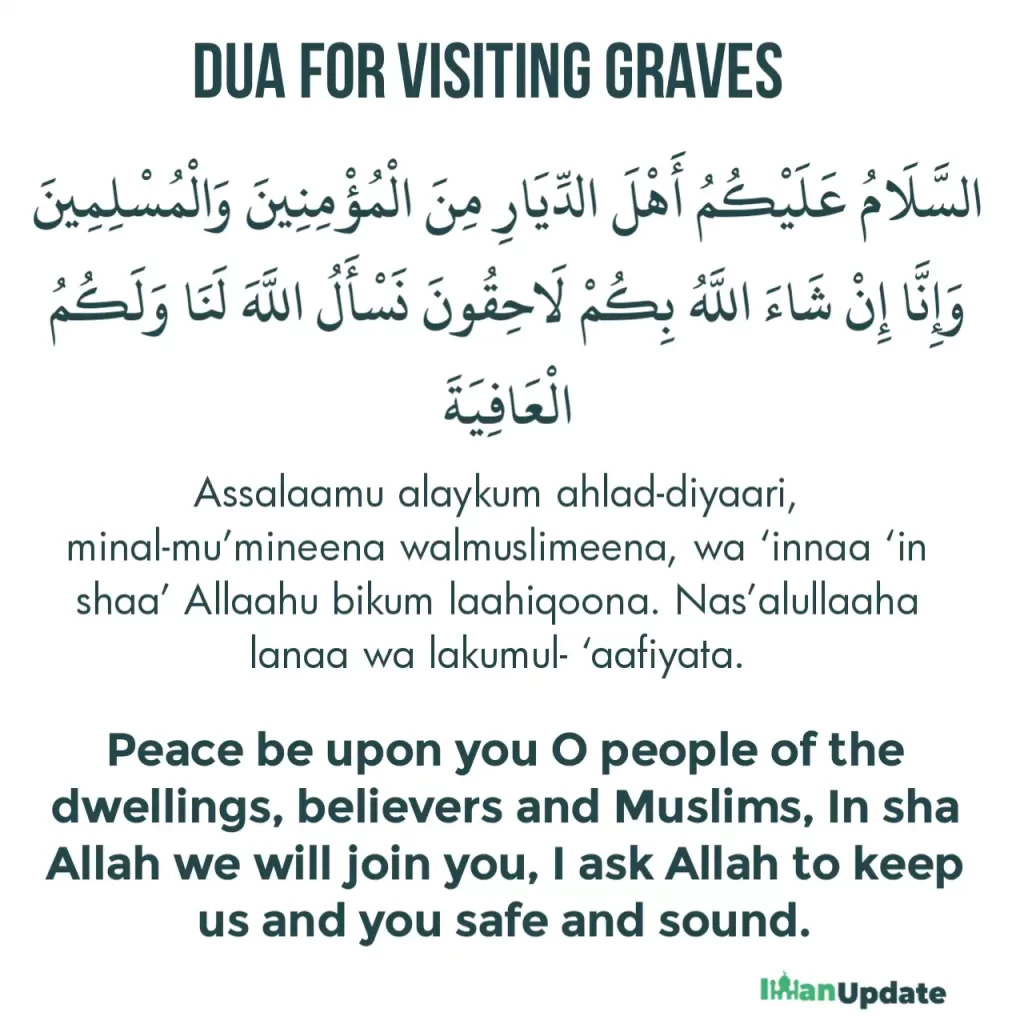
Hadith About The Dua
Sulaiman b. Buraida narrated on the authority of his father that the Messenger of Allah (ﷺ) used to teach them when they went out to the graveyard. One of the narrators used to say this in the narration transmitted on the authority of Abu Bakr:
” Peace be upon the inhabitants of the city (i. e. graveyard).” In the hadith transmitted by Zuhair (the words are):” Peace be upon you, the inhabitants of the city, among the believers, and Muslims, and God willing we shall join you. I beg of Allah peace for us and for you.”
Muslim 2:671, Ibn Majah 1:494
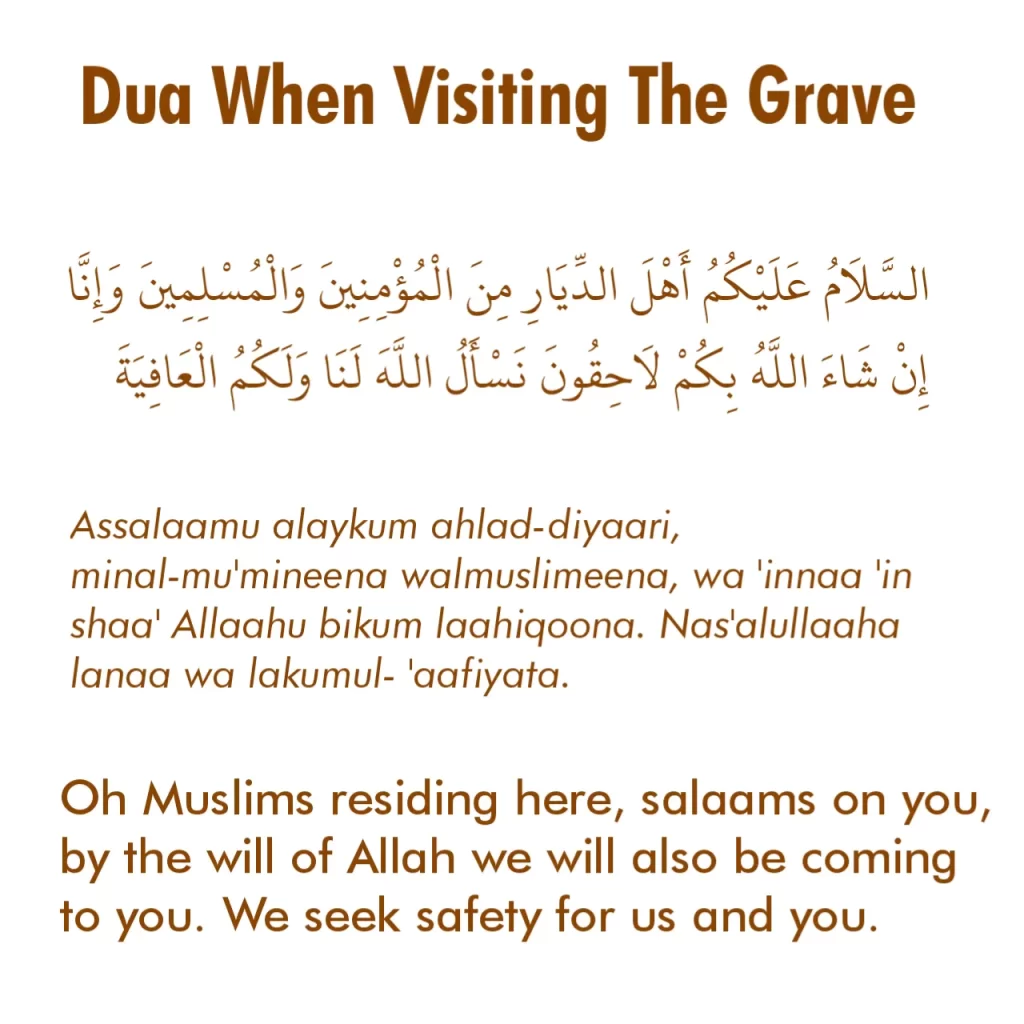
Commentary
Graves are the abodes of the dead. Indeed, man has four abodes:
- The First One: The belly of his mother
- The Second One: This world
- The Third: The grave And
- The Fourth: The Hereafter, which is the final abode and the goal.
We beseech Allah to count you and us among the successful therein. However, are we visiting it to benefit the dead or derive benefit from the visit?
The first objective is to benefit them by supplicating for them, and not to supplicate to them (for help).
Hence, one should visit the cemetery to greet them, as the Prophet SAW would do.
Advertisements
The Prophet used to forbid people from visiting the graves out of fear for people committing Shirk with the inhabitants of the graves.
He SAW banned these people, who are fresh from the practice of Ignorance, from visiting the graves in order to block a means to committing Shirk.
Indeed, Shirk is a grievous matter; hence, the Prophet SAW would block anything that can lead to it.
Advertisements
Therefore, the greater the sin, the stricter its means of control is. Shirk is the greatest form of wrongdoing; the Prophet SAW was asked about the greatest sin, so he said:
‘That you should make a partner for Allah Who has created you’.
Thus, since people used to venerate graves, the Prophet SAW barred them from visiting gravesites.
However, he SAW allowed them when faith has become entrenched in their hearts; he said:
I used to forbid you from visiting the graves, but visit them now; they will remind you of the Hereafter.
The Prophet if lifted the ban and permitted visitation to gravesites; rather, he encouraged it with his statement:
They will remind you of the Hereafter.
Therefore, it is obligatory for a person to do what will remind him of the Hereafter. This is because the heart slacks once it forgets the Hereafter and affairs of the world occupy it.
Ultimately, he will lose the world and the Hereafter, because whoever loses the Hereafter has lost this world and the Hereafter.
Therefore, it is important for us to visit the graves.
Aa’ishah (may Allah be pleased with her) explained that whenever the Prophet SAW is with her, he would go out in the later part of the night to visit and greet the dead at Baqee.
He would say:
‘Peace be upon you, O inmates of the abode of the believers, it has come to you what was promised you, you are tarried till tomorrow, and we, if Allah wills, shall follow you’.
Then he SAW would say:
‘O Allah, forgive the inhabitants of Al-Baqee Al-Gharqad this is the cemetery of the people of Madeenah.
It is hoped that this supplication will encompass everyone who will be buried in the cemetery until the Day of Resurrection.
However, the supplication may be for the inhabitants of Al-Gharqad at the time of the Prophet SAW, and not those who came after them.
Nevertheless, whoever belongs to the people of mercy will earn that mercy irrespective of this supplication.
In addition, the miserable people are not included in the supplication, and they will not derive any benefit from it.
The important point is that one should visit graveyards anytime- night, afternoon, morning or evening, even on Friday or any other day; it does not have a specific time.
Visit a graveyard whenever your mind becomes unmindful and your soul bonds with this world.
Then, you should ponder over those who were like you yesterday on earth, eating, drinking and frolicking, where did they go?
Now, they are hostages to their deeds, and nothing will benefit them except their deeds.
The Prophet SAW said:
‘Three things follow the dead: His wealth, family and deeds; two will go back and one will remain (with him).
His family and wealth will go back, and his deeds will remain.
Therefore, think of these people, and convey the greeting to them: Peace unto you O inmates of the abode of the believers.
What is clear from this text – Allah knows best – is that they will respond to the greeting.
This is because the greeting will be conveyed in second person pronoun, ‘Peace unto you’.
It can be inferred that it is simply a supplication for them, be it they hear it or not, or they respond to it or not.
Anyway, one should supplicate for them and say, affirming the inevitable journey: ‘We shall follow you if Allah wills’.
This ‘Insha Allah, Allah willing, refers to the time of joining them, not its essence, because following them is certain.
Guaranteed events are not delineated with Insha Allah, so this refers to the time of joining them because none knows when the end will come.
Thus, the meaning of ‘We shall follow you if Allah wills’ is ‘We shall follow you when Allah wills’.
This is similar to Allah’s Statement, the Mighty and Sublime:
Then, when it is His Will, He will resurrect him (again). Nay, but (man) has not done what He commanded him.
[Surah Abasa: 22-23].
Then the visitor should make supplication that is established by the Sunnah.
If he does not know any of it, he should supplicate in a manner that is easy for him.
He may say:
O Allah forgive them, have mercy on them, O Allah do not deprive us of their rewards, and do not make them trials for us after they have gone, forgive us and them’.
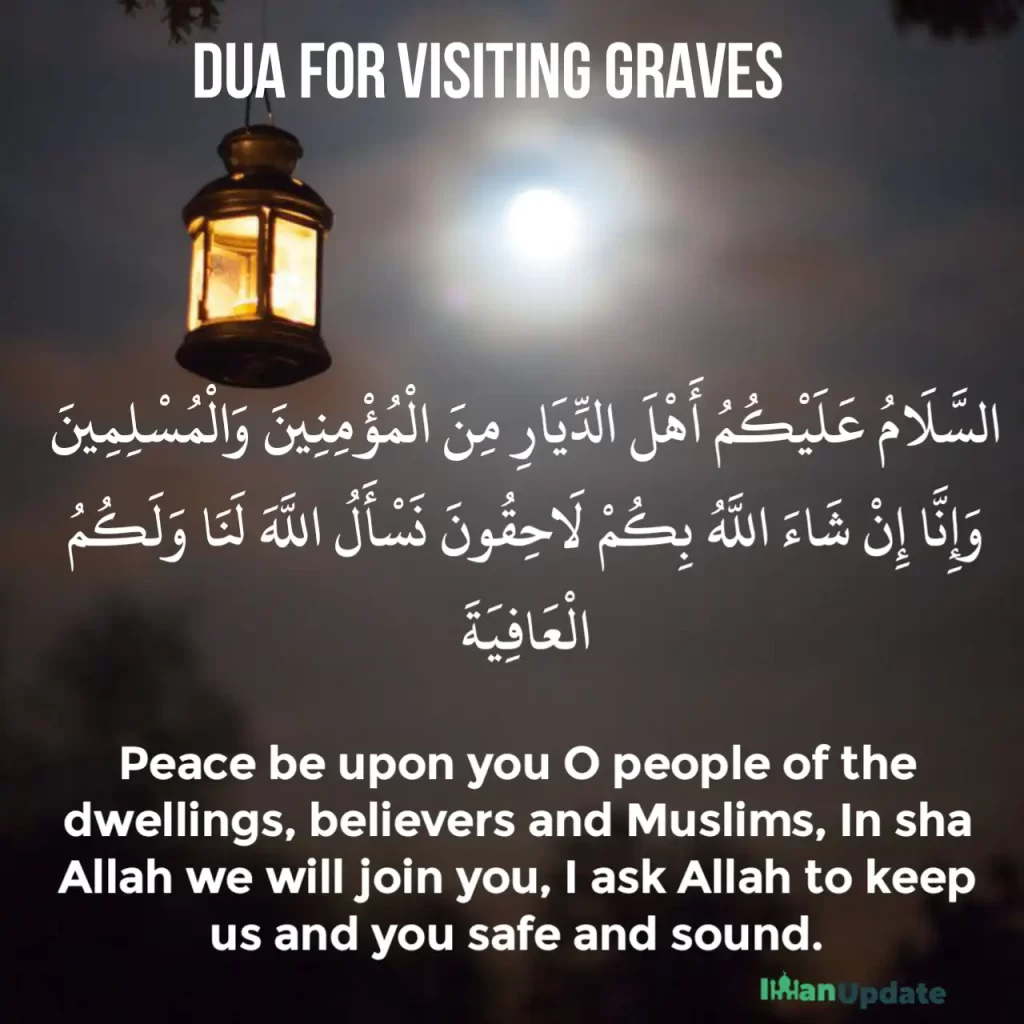
Then, he may leave. This is what the Prophet SAW would do whenever he visits the graves.
As for what some ignoramus do, such as staying there, rolling about on the earth, circumambulation of the grave and similar acts, these are all prohibited matters and abominable innovations.
And if it is believed that all these dead could bring benefits or cause harm, such person has become an infidel, refuge is with Allah, who has left the pale of Islam.
This is because no dead can bring benefit or cause harm; they can neither supplicate for you nor intercede on your behalf except with the permission of Allah, the Mighty and Sublime.
Moreover, the grave is not the time for intercession, which will be on the Day of Resurrection.
Hence, they will not benefit you in anyway when you pray to them, ask them for intercession or similar matters.
Thus, it is obligatory for our brothers to practise this in their lands and admonish the ignoramus and they should tell them that the dead do not bring any benefit.
Indeed, the Prophet SAW cannot bring any benefit to anyone, as he is dead.
When the Prophet SAW was alive, the companions would come to him when they are afflicted by drought.
They would ask him to beseech Allah for rain, and the Prophet M would do so.After his death, the companions never came to his grave and said:
Call Allah to bring us water’, though his grave was nearby in the mosque. So, when they suffered from drought during the time of Umar (may Allah be pleased with him), they supplicated:
O Allah! We used to ask You to give us rain through your Prophet, and You would do so. That is, they would ask the Messenger of Allah SAW to call Allah for them and they would get rain.
But we now ask You through the uncle of our Prophet, so give us rain.
Then Al-Abbaas would proceed to beseech Allah. They did not say: O messenger of Allah, call Allah to give us rain; call Allah to remove the drought from us’.
They did not do that because they knew it was not possible. When man dies, all his deeds will end as he will not be able to carry out any act.
The Messenger of Allah SAW said: When a person dies, all his deeds will cease except from three…’
So, the dead cannot ask Allah for forgiveness or supplicate for you because all his deeds have been cut off.
The important point is that visiting the graves is for the benefit of its inhabitants, not the visitors.
However, Allah, the Mighty and Sublime, will reward the visitor for his visit, but he does not derive any benefit from the dead.
Likewise, he will benefit from the reminder that will fill his heart if Allah, the Mighty and Sublime, counts him among those whose hearts will take guidance.
From Explanation Of Riyadus Saliheen By Sheikh Salih Al Uthaiymeen.
The condition of people when visiting the graves
The condition of people when visiting graves include the following four situations:
- First: The person visits the graves to supplicate for the dead. They ask Allaah to forgive and have mercy on them, and to take heed of the situation of the dead and what they are going forth to.
That causes them to take a lesson and reminder from that; this is a legislated type of visiting.
- Second: They go there to supplicate for themselves and for their loved ones there, believing that supplication at the graveyards or graves of righteous is better and more likely to be accepted.
This is a reprehensible innovation.
- Third: They go there to supplicate to Allaah while using as a medium the position and status of the dead or on their behalf, by saying: ‘My Lord, I ask You through the status of so-and-so, and by right of so-and-so.’
This is a forbidden innovation, and a means to polytheism.
- Fourth: They go there to supplicate to those who are buried, seek help through them, and ask them for aid, assistance, cure, and so forth.
This is major polytheism that removes one from the fold of Islaam.
May Allaah the Exalted make us and our Muslim brothers and sisters among those who remember Him abundantly, and glorify Him by day and by night, indeed, He is all-Hearing, and answers supplications.
We ask Allah, the Mighty and Sublime, to count you and us among those who rely on Him.
Advertisements

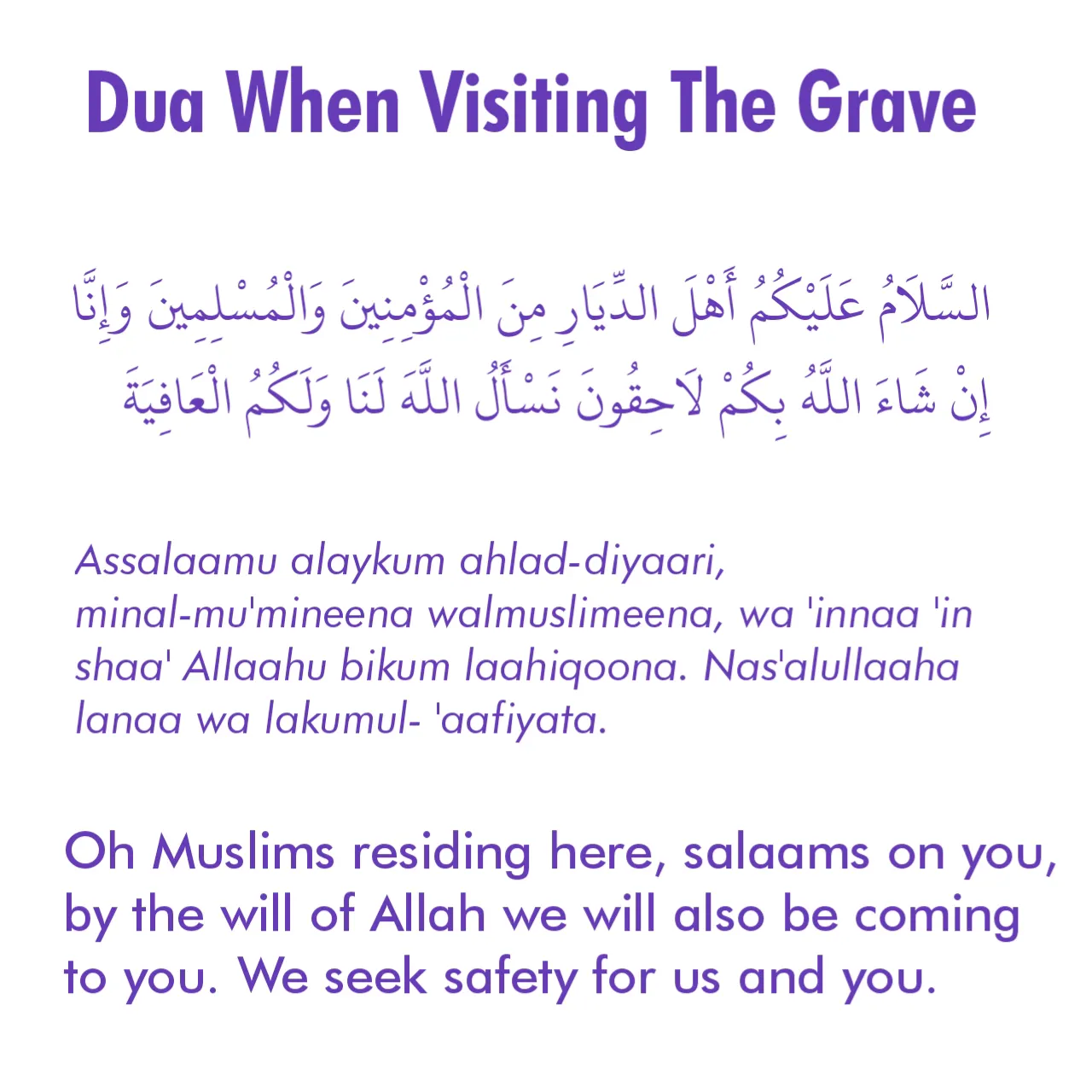




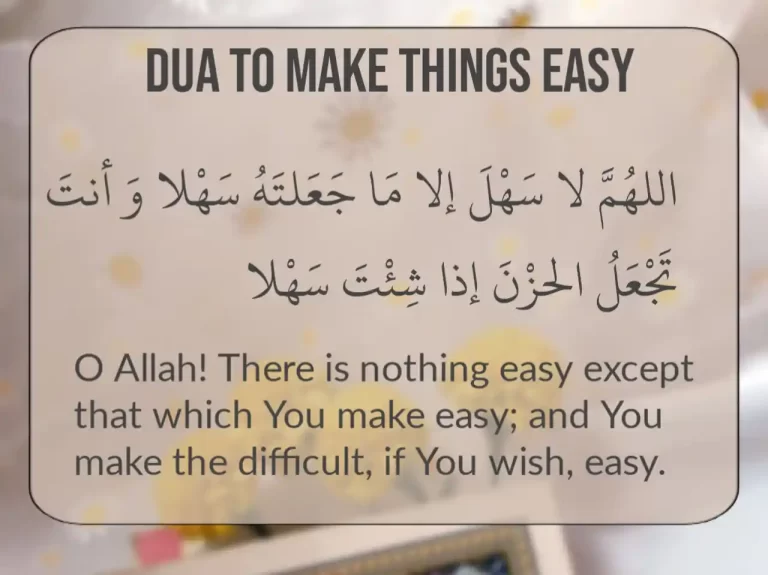
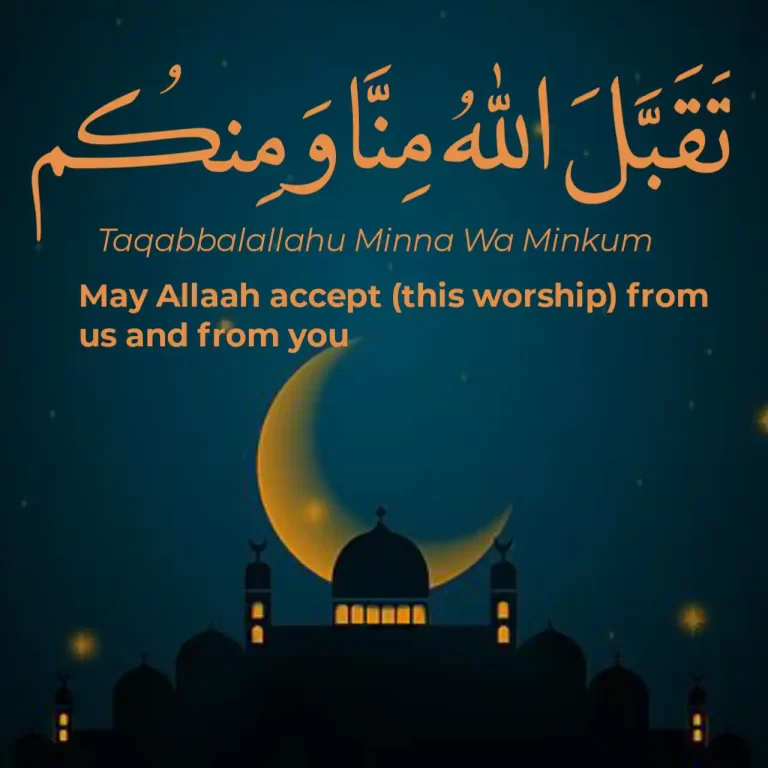
2 Comments